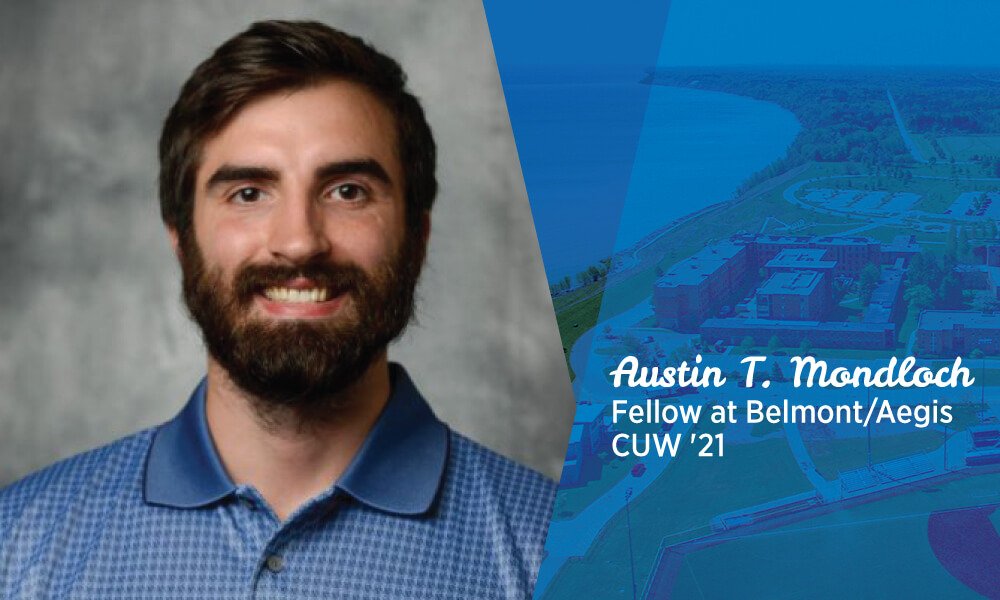
If you’re thinking about a residency after pharmacy school, read about Austin’s experience in pursuing a fellowship.
Residency series: Why Austin pursued a fellowship
After graduating from pharmacy school, you can pursue more clinical education or research. If you choose to pursue clinical education, that’s called a residency. A pharmacy residency is an organized, directed, postgraduate training program in a defined area of pharmacy practice. It provides the knowledge and experience to further training with a clinical focus. During residency, a resident is able to perform as a licensed practitioner but train under the supervision of an experienced preceptor.
But, if you choose the research route, that’s called a fellowship. Concordia University Wisconsin’s School of Pharmacy graduates often pursue either a residency or a fellowship.
What is your current role?
I’m the Clinical Pharmacist Fellow in Drug Information at Belmont University in association with Aegis Sciences Corporation.
Where are you doing your fellowship?
I’m completing my fellowship in Nashville, Tennessee.
Within this first year, my main two roles are teaching at the Belmont University College of Pharmacy and answering drug information questions in the Christy Houston Foundation Drug Information Center. I’ve been co-teaching Biomedical Literature Evaluation with Dr. Genevieve Engle and my co-fellow, Dr. Matthew Sherman. I’ll also instruct our Drug Information course in the spring semester with Dr. Engle.
In the second year, I’ll work at Aegis Sciences Corporation in the toxicology field of pharmacy. My work will involve assisting medical facilities with their testing products and to answer pharmacology inquiries from our clients.
Why did you decide to become a pharmacist?
I discovered my interest in pharmacy through my passion for chemistry class during high school. I liked the idea of being able to utilize my science knowledge to improve health outcomes for patients. Eventually, I worked a job as a pharmacy clerk during my senior year of high school. I’ve worked in pharmacy ever since then.
Once I found out about the pharmacy program at Concordia and researched it, I realized I wanted to pursue this program. I knew for a long time I wanted to be involved with healthcare in some aspect, and I knew pharmacy was God’s plan for me in the end.
What made you want to pursue a pharmacy fellowship after graduation?
My mentors taught be about the non-traditional side of pharmacy that I can get involved with, and many classes at Concordia helped prepare me for a fellowship. Even through guidance of my peers, I learned more about fellowships, which helped me realize it is a great stepping stone into future career options such as the pharmaceutical industry or even academia.
What differentiates a fellowship from a residency?
The major difference, in my opinion, is the unique variety of roles pharmacy fellows fulfill in terms of medicine and patient care. With my fellowship, I work in the background of health care, and that I see patients from a thousand foot-view. Even though I do not directly deal with patients, I assist local pharmacists and physicians with answering drug information questions that will either help one patient specifically, or multiple patients through the research we provide at the Christy Houston Drug Information Center located in the Belmont University College of Pharmacy.
How did Concordia University Wisconsin help prepare you for a pharmacy fellowship?
Concordia emphasizes pharmacology and medicinal chemistry, and these courses helped prepare me. Additionally, the leadership and teaching assistant roles they allow students to get involved with have helped prepare me. I felt that the community at Concordia allows students to grow in their abilities while working alongside their professors as peers and professionals.
How do you think your fellowship is preparing you for a successful career in pharmacy?
Through the guidance of my mentor, Dr. Genevieve Engle, I’ve continued to grow towards being the best drug information pharmacist I can be. My experiences at Belmont thus far have helped me see the academic world from a different perspective, which has been a learning experience all on its own. I’ve learned that I should take every learning experience that I can get. This has been a valuable lesson for me.
What has been the most memorable moment of your fellowship?
My most memorable moment would be the “TedTalk”- style presentation at Belmont University during Belmont’s Presidential Inauguration Week for our new President, Greg Jones. The presentation entitled How to Assess and Interpret Online Health Information focused on how to identify misinformation and what we as a society can do to prevent misinformation from spreading. My co-fellow, Dr. Matthew Sherman, and I gave this presentation.
What advice do you have for future pharmacists?
Overall, my advice would be to get as involved as you can. Pharmacy allows so many opportunities, and it is up to the individual to take advantage of the opportunities that arise. I feel that pharmacists can make an incredible impact. Although we need to take the initiative to make that impact in our patients’ lives.
Do you want to learn more?
Pharmacy is a great way to positively impact healthcare. Have you considered a future in pharmacy? If you’re interested in learning more about what Concordia’s School of Pharmacy is like, visit us here.
This blog was originally published on December 16, 2021. It has been updated to reflect current information.